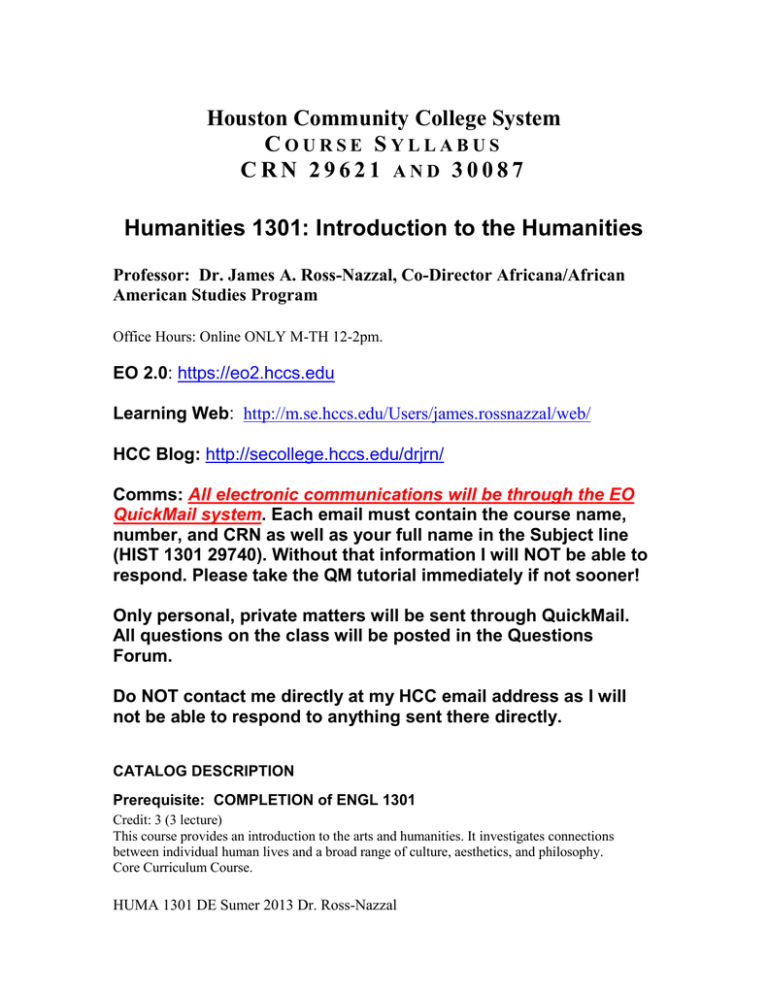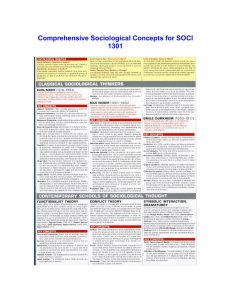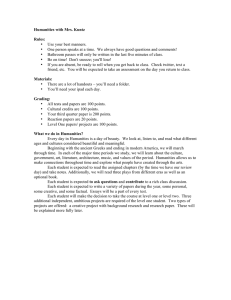
Houston Community College System
COURSE SYLLABUS
CRN 29621 AND 30087
Humanities 1301: Introduction to the Humanities
Professor: Dr. James A. Ross-Nazzal, Co-Director Africana/African
American Studies Program
Office Hours: Online ONLY M-TH 12-2pm.
EO 2.0: https://eo2.hccs.edu
Learning Web: http://m.se.hccs.edu/Users/james.rossnazzal/web/
HCC Blog: http://secollege.hccs.edu/drjrn/
Comms: All electronic communications will be through the EO
QuickMail system. Each email must contain the course name,
number, and CRN as well as your full name in the Subject line
(HIST 1301 29740). Without that information I will NOT be able to
respond. Please take the QM tutorial immediately if not sooner!
Only personal, private matters will be sent through QuickMail.
All questions on the class will be posted in the Questions
Forum.
Do NOT contact me directly at my HCC email address as I will
not be able to respond to anything sent there directly.
CATALOG DESCRIPTION
Prerequisite: COMPLETION of ENGL 1301
Credit: 3 (3 lecture)
This course provides an introduction to the arts and humanities. It investigates connections
between individual human lives and a broad range of culture, aesthetics, and philosophy.
Core Curriculum Course.
HUMA 1301 DE Sumer 2013 Dr. Ross-Nazzal
COURSE PURPOSE
To develop student thinking, seeing, reading, writing, and listening skills and expand his/her
knowledge of the human condition as portrayed in works of the human imagination and intellect.
DESCRIPTION OF COURSE CONTENT
Students focus on the connections between their own lives and the ideas and values expressed in
works of human imagination and thought. Through inquiry into selected literature, philosophy,
and the visual and performing arts, students will engage in critical thinking, form aesthetic
judgments, and develop an appreciation of the arts and humanities and their pivotal role in the
health and survival of any society. Students will attend and respond to museum and gallery
exhibitions and performances (live theater and film). They will be introduced to readings in
several genres from a variety of cultures. Students will respond to the work they study in a variety
of ways including oral presentations, formal written assignments, and informal journal responses.
TEXTBOOKS
Sayre, Henry. The Humanities: Culture, Continuity and Change, Vol. 1, Pearson, Prentice Hall,
2013. (2nd edition).
Student Learning Objectives
1.
2.
3.
4.
Recognize a variety of works in the arts and humanities.
Understand those works as expressions of individual and human
values within a historical and social context.
Analyze objectively works in the arts and humanities.
Articulate a personal (subjective) reaction to works in the arts
and humanities.
HCCS Humanities in the Core Curriculum
Humanities 1301 may be taken to fulfill the core curriculum requirement for 3 semester
hours in Cross/Multicultural Studies.
Critical Thinking Skills (HUMA 1301 and HUMA 2319)—to include creative thinking, innovation,
inquiry, and analysis, evaluation and synthesis of information
Communication Skills (HUMA 1301 and HUMA 2319)—to include effective development,
interpretation and expression of ideas through written, oral and visual communication
Personal Responsibility (HUMA 2319)—to include the ability to connect choices, actions and
consequences to ethical decision-making
Teamwork (HUMA 1301)—to include the ability to consider different points of view and to work
effectively with others to support a shared purpose or goal
Social Responsibility (HUMA 1301 and HUMA 2319)—to include intercultural competency, knowledge
of civic responsibility, and the ability to engage effectively in regional, national, and global communities
Learning Outcomes:
HUMA 1301 DE Sumer 2013 Dr. Ross-Nazzal
Upon successful completion of this course, students will:
1. Demonstrate awareness of the scope and variety of works in the arts and
humanities.
2. Articulate how these works express the values of the individual and society within
an historical and social context.
3. Articulate an informed personal response and critically analyze works in the arts and
humanities.
4. Demonstrate knowledge and understanding of the influence of literature,
philosophy, and the arts on cultural experiences.
5. Demonstrate an awareness of the creative process and why humans create.
The objective of the humanities and visual and performing arts in a core curriculum is to
expand students’ knowledge of the human condition and human cultures especially in relation to
behaviors, ideas, and values expressed in works of human imagination and thought. Through
study in disciplines such as literature and the visual and performing arts, students will engage in
critical analysis, form aesthetic judgments, and develop an appreciation of the arts and humanities
as fundamental to the health and survival of any society. Students should have experiences in
both the arts and humanities.
The objective of the cross/multicultural component of the core curriculum is to introduce
students to areas of study which enlarge their knowledge and appreciation of the multicultural and
multiracial world in which they live.
Graded Work:
I. Exams. The Midterm covers the first half of the material and the Final covers the
second half of the material. I will post the exams at least two weeks before they are due.
Follow the directions on the exams. You will upload them as Word files to the EO Unit.
You are required to use evidence from the assigned textbook and assigned lectures.
Students who use sources that I did not assign will receive a zero on the assignment.
II. Culture Assignments. Draft 750 word essays examining the major characteristics of
Mesopotamian (1) and Greco-Roman (2) culture. Upload your essays in the EO
classroom as Word files. You are required to use evidence from the assigned textbook
and assigned lectures. Students who use sources that I did not assign will receive a zero
on the assignment.
Scholastic Dishonesty: The Houston Community College System Student Handbook 1999/2000 defines
the following criteria: "Scholastic dishonesty includes, but is not limited to, cheating on a test, plagiarism,
and collusion." Plagiarism means the appropriation of another's work and the unacknowledged
incorporation of that work in one's own written work offered for credit. Collusion means the unauthorized
collaboration with another person in preparing written work offered for credit. Students who engage in
scholastic dishonesty will be given an F in the class.
HUMA 1301 DE Sumer 2013 Dr. Ross-Nazzal
Participation. Participation is required if you want to succeed (i.e., pass): Remember,
you have something due each week.
ADA: Any student with a documented disability (e.g. physical, learning, psychiatric, vision, hearing, etc.)
who needs to arrange reasonable accommodations must contact the Disability Services Office at the
beginning of each semester. Faculty is authorized to provide only the accommodations requested by the
Disability Support Services Office.
Student Attendance: Life is too short to repeat in lecture what is available in your
readings, thus relentless attendance is required. If miss “just one day” you truly miss a lot
because my lectures, like history, are tightly integrated. Successful students attend class
with a tenacity of purpose.
Grades
The grade of A (100-90) reflects excellence. The A work offers a well-focused and
organized discussion appropriate to the instructor's assignment, reflects critical use of all
relevant materials, and demonstrates effective and formal writing requirements. Work
must demonstrate outstanding efforts to identify and use varied and pertinent evidence
from all available sources, to employ those materials critically in the text of the papers,
and to provide error-free citations of those resources. A work is handed in on time.
The grade of B (89-80) represents work beyond satisfactory and indicates the work was
completed in an appropriate and competent manner and, in general, demonstrates a strong
attempt at original and critical analysis, writing, and research. Work must demonstrate
beyond satisfactory efforts to identify varied and pertinent evidence from all available
sources. The B paper may contain a number of minor errors of grammar or citation, and
its thesis or its conclusions may be undeveloped or too weakly supported. B work is
handed in on time.
The grade of C(79-70) indicates that the work was done in a satisfactory or appropriate
fashion and represents the average work expected for university courses. In order to
obtain a C grade, your work must adhere to all of the assignment’s minimum
requirements to include but limited to page/word requirements, number of sources, types
of sources, and proper citation method. The work is organized around a central idea with
arguments supported by relevant examples from the available sources. The work is
structured into correctly written paragraphs and sentences. Although fulfilling the
assignment, the C work may exhibit one or more weaknesses including, but not limited
to, errors of punctuation and grammar, imprecise or incorrect word use, inaccurate or
uncritical use of materials, occasional inconsistency of organization or development, and
lack of direct relevance of the selected research materials to the topic. C work is handed
in on time.
The grade of D (69-60) indicates that the work may have a poorly defined topic or thesis,
lacks clear focus or organization, and contains unsupported generalizations or
conclusions. Research support (citations) is inadequate, not clearly relevant, or
improperly documented. A less-than-minimal research effort is evident. D works fails to
obtain the required page or word minimum requirement. The work may also suffer from
numerous or major formal writing errors. D work fails to adhere to any of the
assignment’s minimum requirements. D work is handed in on time.
HUMA 1301 DE Sumer 2013 Dr. Ross-Nazzal
The grade of F (59-1) indicates that the work is not clearly relevant to the assignment and
that its topic and thesis are poorly focused or defined. The work may display inadequate
organization or development, unsupported generalizations, and nonstandard formal
features (including language usage, sentence structure, and paragraphing). Research
support (citations) is absent, or irrelevant to the assignment. F work is handed in on time.
The grade of 0 indicates that the work was not submitted at all or submitted after the due
date/time. Remember any cheating whatsoever will result in an F for the course. Do you
remember what happened to SMU in 1987?
http://www.dallasnews.com/sharedcontent/dws/spe/2004/feb25football/smu.html
Late Work. I do not accept late work, for any reason. Do not ask me to accept late
work. If any holidays, parties, work, vacations, family obligations, legal matters, or
secular or religious responsibilities prevent you from completing the work when it is
due, please do not take this class as I do not negotiate assignments or due dates. In
order to pass you must have submitted all work. Students who fail to submit just
one assignment will receive the final grade of F/X.
Missed Assignments. I do not allow make ups for any reason. Do not ask me if there
are any make up assignments.
Extra Credit. I do not offer such a thing, for any reason, thus please do not ask me
to entertain such a thing. Please leave all high school thoughts behind.
Please note that this is not an independent study class. There are
required, weekly interactions among class members and myself, and
every assignment has a due date that I will not negotiate. Thus, please
do not ask for me to accept late work or to make up missed work. You
are responsible for your academic careers, so take charge and be the
boss of you.
EXTENSIONS. Sometimes students cannot, for whatever reasons,
get their work submitted on time so they ask me for an extension. The
answer is no. Everything has a specific due date which I will not
negotiate, extend, or alter. Never ask me for an extension, you will
not like my response.
HCC Grading Scale:
A = 90 – 100
B = 80 – 89
C = 70 – 79
D = 60 – 69
F = 59 and below
HUMA 1301 DE Sumer 2013 Dr. Ross-Nazzal
In order to pass, you must submit all graded and non graded
assignments, assessments, and work. Failure to submit just one
assigned work will result in you being awarded the grade of F/X
for the class.
A Final Thought on Grades – Getting good grades is easy. All you
have to do is to keep up with the readings, attend class with a
tenacity of purpose, take full and complete notes as I lecture and as
you read, review your notes on a daily basis, take advantage of my
office hours, and put forth the required efforts on all class
assignments. No one has more control over your grades than
yourselves. You will do well (i.e., pass) when you decide that studying
is what is important and if you take the necessary steps to do well.
Ultimately, you are responsible for your success or failure
W. Students who fail to submit the first graded assignment will be withdrawn from
the course. Students who fail to submit any additional assignments will be
withdrawn from the course.
HUMA 1301 DE Sumer 2013 Dr. Ross-Nazzal
HUMANITIES 1301 - WEEKLY CALENDAR
DATES
MATERIAL TO BE COVERED
8/25-9/21
Read chapters 1-3; Listen to all lectures covering chapters 1-3; and
submit the first Culture Assignment NLT 11:59pm 9/21.
9/22-10/19
Read chapter 4; Listen to all lectures covering chapter 4; submit
the Midterm Exam.Due NLT 11:59pm Sun 10/19.
10/20-11/16
Read chapters 5-7; Listen to all lectures covering chapters 5-7;
Submit second Culture Assignment.Due NLT 11:59pm 11/16.
11/17-12/7
Read chapter 8; Listen to all lectures covering chapter 8;
DEC. 8th
Final Exam. Due NLT 11:59pm
HUMA 1301 DE Sumer 2013 Dr. Ross-Nazzal



